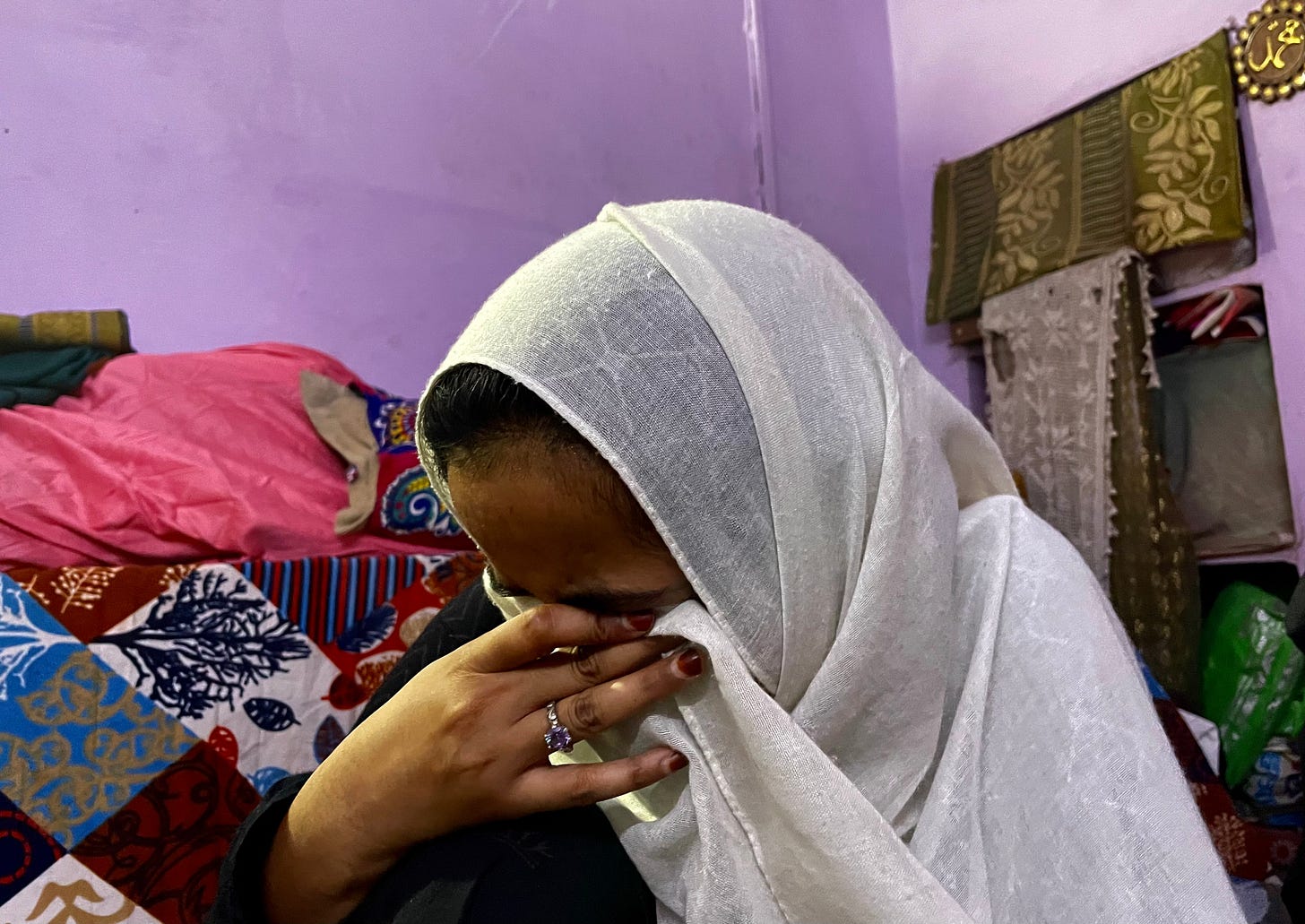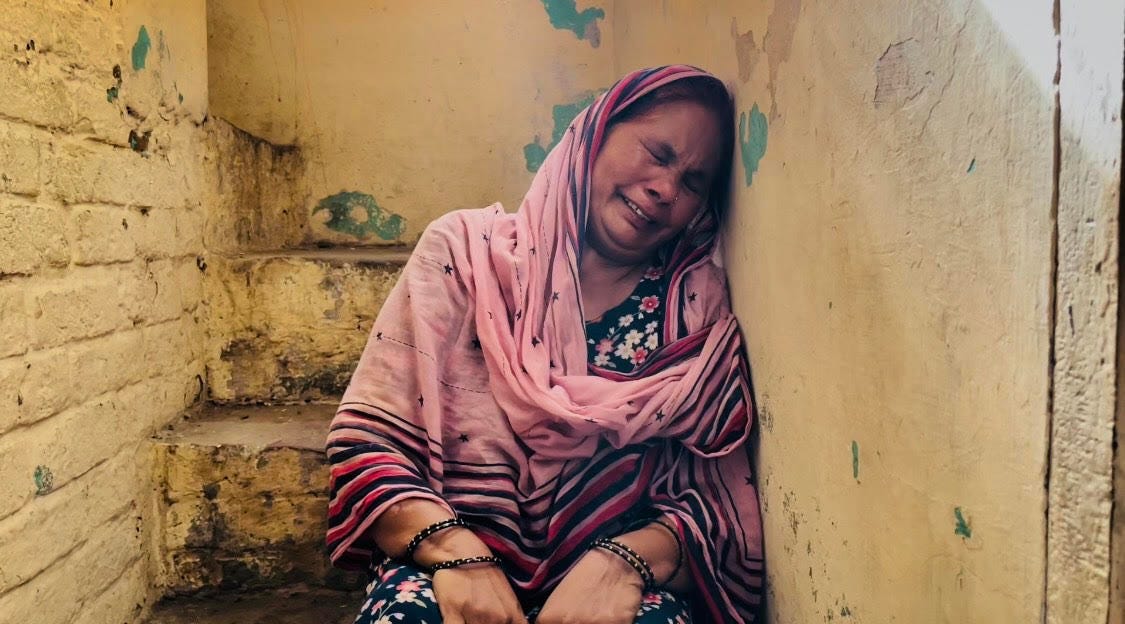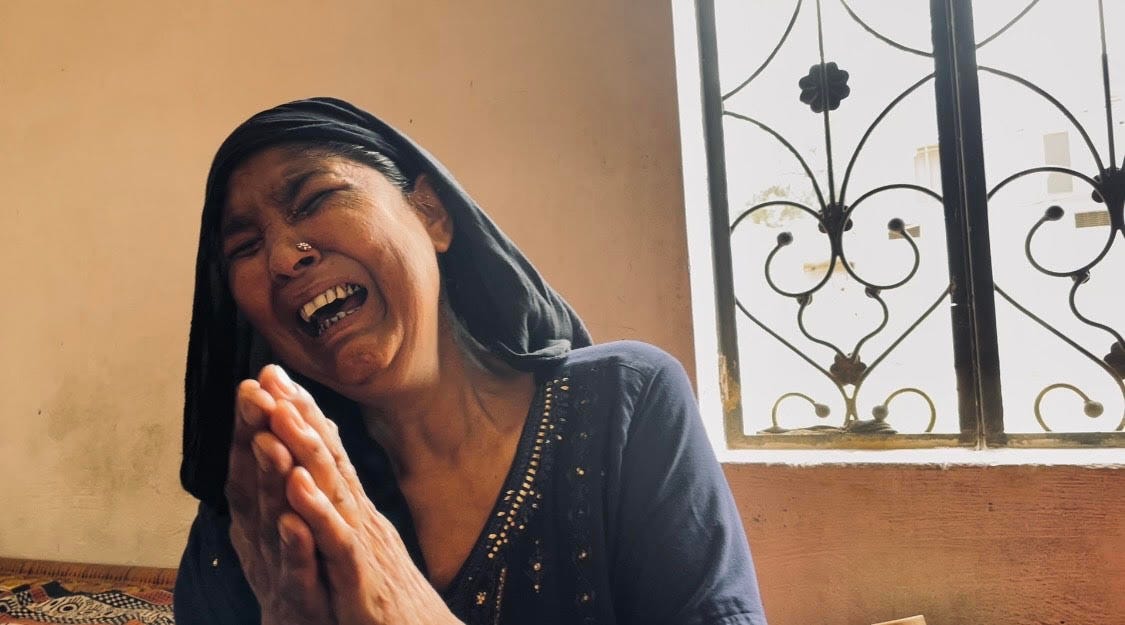Muslims in Saharanpur bear testimony to an unending cycle of hate
Families allege police brutality, arbitrary arrests and unlawful demolitions in UP’s Saharanpur
Journalist Arbab Ali brings a haunting ground report from Saharanpur with devastating images of victims and family members. A report that bears witness to the relentless state sanctioned hate against Indian Muslims
Rana Ayyub
Twenty four year old Mohammad Saif worked at a garment store in the Saharanpur district of western Uttar Pradesh, ruled by Narendra Modi’s BJP. On the 10th of June he offered his Friday prayers at the local mosque, Masjid Pakka Bagh, and then proceeded to attend a wedding feast in the neighborhood, unaware that his life was about to take a turn for the worse.
At around five in the evening, Saif asked two of his friends, Imran and Mohammad Taufiq, to check on a sick friend. Around 6 pm the same day, Rahat, Saif’s best friend who worked in the southern Indian state of Kerala, asked his friends to accompany him to the office of a travel agency to book a bus ticket to Delhi. While on their to the travel agency, the police asked them to stop their bikes. “They asked them to sit in the police jeep. My brother told them they had done nothing, but they (the police) forcefully pushed them in the jeep,” said Zeba (27), Saif’s sister.
Saif and his three friends are amongst the ninety one Muslims, including two alleged minors, who were arrested in Saharanpur in Uttar Pradesh following protests on June 10th, over derogatory remarks made against Prophet Muhammad (PBUH) by a former Bhartiya Janata Party spokesperson.
Background of Friday protest in Saharanpur
The protest took place after the afternoon prayers on June 10, when a crowd of more than fifteen hundred Muslims marched from the Juma (Friday) mosque to the Ghanta Ghar (Clock tower) in the city. The two places are located less than a mile from each other. The protestors chanted ‘Allahu Akbar’ (God is great) and demanded the arrest of Nupur Sharma, former spokesperson of BJP who had denigrated Prophet Muhammad.
Apart from Saharanpur, protests also broke out in eight other districts of Uttar Pradesh – Prayagraj (known as Allahabad), Hathras, Ambedkar Nagar, Moradabad, Firozabad, Lakhimpur Kheri, Aligarh and Jalaun; with the police arresting a total of three hundred and sixty three people from across the state as of June 18th.
The protestors were booked under stringent sections of the Indian Penal Code 1860 (related to rioting and assault on public servant), Section 7 (Molesting a person to prejudice of employment or business) of the Criminal Law Amendment Act 1932.
Police brutalise Muslim men in viral video; hailed by Hindu right wing
Saif who was last seen by his friends and family at the wedding feast was later seen by them, much later, when a video of him being beaten mercilessly by cops went viral all over the country.
The video was shared by a legislator of the ruling Bharatiya Janata Party, where he labeled the savage brutality enacted by the Police on the Muslim men as a ‘return gift’.
The legislator Shalabh Mani Tripathi, who later deleted the video after public outrage, tweeted a 32 second video clip where two policemen are seen repeatedly hitting nine men with lathi (long baton), in a room, while the men pleaded for mercy. The torture continued unabated even after some of the men were seen writhing in pain and begging for mercy as they bled and suffered serious injuries. By the time the video was deleted, the savagery inflicted on the Muslim men had garnered over two million views.
When this reporter asked Saif’s sister, Zeba if she recognized any of the nine men being tortured in the video, she said, “my brother (Mohammad Saif) and his three friends are in the video.” She confirmed that the video was from Thana Kotwali Nagar Police Station in Saharanpur.
Zeba breaks down seeing the viral video of her brother (Mohammad Saif)
Zeba is devastated by the inhumanity and the accompanying celebration on social media at the brutality and humiliation being inflicted upon her brother and his friends. “People are commenting on the video saying, ‘good job police’ and ‘nice beating’. They have become heartless. They find bliss in our (Muslim) oppression,” she said.
Zeba met her brother in prison on June 13th and alleges that he had sustained injuries from the brutal beating of the police. She also alleges that the jail authorities had refused to provide medical attention to her brother.
Members of Rahat and Taufiq’s families also confirmed that they were beaten in police custody. Rahat’s brother, Hakeem (29), alleged that Rahat’s hands were fractured as a result of the torture.
Speaking on the viral video of the torture of Muslim men, Senior Superintendent of Police (SSP) of Saharanpur, Akash Tomar, said that he had instituted an inquiry under SP City (Rakesh Kumar) to investigate the incident and promised action against police officials involved. Interestingly, the same official when confronted earlier with the video of the torture, had denied any knowledge . The words of instituting an enquiry by the Police officials ring hollow when savagery and brutality of Muslims in the country has been reduced to a norm.
On the 17th of June, five days after the Friday protest by Muslims, army aspirants took to the streets to protest a new recruitment policy introduced by the Government of India. They burnt trains, barged into police stations, torched it to ashes, destroyed public property, vandalised public offices, shouted abusive slogans against the Prime Minister of India and brought the country to a standstill. Far from any action, the men were exhorted as ‘our sons’ by the senior Police officials who had less than a week ago brutalized young Muslim protestors, incarcerated them in prisons and bulldozed their homes for peacefully protesting against hate crimes against them.
In the northern city of Ranchi, Jharkhand, two Muslim boys were shot dead by cops with brazen impunity for protesting the rise in hate against Islam and Muslims. The minority “privilege” of the 220 million Muslims in India under the Modi regime is a long, enduring tale of wrongful incarceration, abuse, torture, humiliation and hate that is all pervasive.
Earlier this month, the same Uttar Pradesh police that arrested Saif and his friends was subject of public outrage when five policemen in Budaun district allegedly inserted rod in a 22 year old Muslim man’s rectum and electrocuted him.
Families allege wrongful incarceration of Muslims
Twenty eight year old, Mohammad Bilal worked at a hosiery shop in the Hussain Basti neighbourhood, where he lived with his family. According to his brother, Mohammad Sarfaraz, on the 10th of June Bilal offered prayers at the Jama Masjid and headed home. As he stepped out at five in the evening, he was indiscriminately picked up by cops
“The home guards picked him up from Bawa Cycle Store in the city around five in the evening. When my brother asked them why they were arresting him, they slapped him,” said Sarfaraz.
Bilal was taken to the Kotwali Nagar Police Station. “The policemen took turns to beat my brother. They told him - Muslims are madar***d (motherfuckers)”, said Sarfaraz.
“They had beaten him so badly that when I visited him in the jail that he wasn’t even able to move. He needed assistance to sit. Is being a Muslim a crime in this country?” asks a broken Sarfaraz as his voice fades away in disillusion.
Bilal’s mother, Sanjida Parveen (54), showed this reporter a video of the men arrested being escorted by the police and Bilal, in a black striped shirt, can be seen limping.
When Sanjida was shown the video, she fainted. When she regained consciousness, she only said “mere bete ko mere pass wapis le aao” (bring my son back to me).
Bilal’s mother, Sanjida Parveen (54), cries for the return of her son (Arbab Ali)
The story of inhumanity haunts as I meet the other victims of the June 10 protests.
On June 10, Mehraj was asleep when his friend Furkan called him for help as his son was arrested. “My father hurriedly went to the police station to get Furkan uncle’s son released. But, at the police station, he was also arrested,” said Ahmedi, daughter of Mehraj. Ahmedi alleges that her father was beaten by the police of Kotwali Nagar Police Station on the night of June 10.
Ahmedi wipes off tears with her dupatta. (Arbab Ali)
Mehraj’s mother, Hamida Parveen (63), is a heart-patient. On April nine, 2019 her older son, Nafees had passed away due to suffocation at a political rally in Saharanpur. He was forty one years old at the time of his death and left behind three children aged between 6 and 14 years. “Mehraj used to provide for his brother’s children also. He is the only breadwinner of our family and now he’s in jail for something he did not do. Who will take care of our family now?” asks Parveen.
Bulldozer justice in Saharanpur; houses of two accused partially demolished
On the morning of June 11, the district administration of Saharanpur in Uttar Pradesh, partially demolished the houses of Muzzamil and Abdul Vakir, who have both been accused of rioting and were arrested on June tenth.
According to several legal experts, there are no provisions under Indian law to demolish the home of anyone accused of a crime, however this pattern of “justice” has been frequently observed across several Bharatiya Janata Party ruled states.
Muzzamil’s mother, Bano (57) alleged she only got to know about her son’s arrest when a government official came to enquire if Muzammil lived in the same house.
“All I can hear in the news is the statements of SSP (Senior Superintendent of Police) calling my son the mastermind of the protests. Why is the Muslim leadership in India not speaking for my son? Where is Saudi Arabia that spoke of denigration of Prophet Muhammad now?” asked Bano.
Bano claims her son is seventeen, a minor. “How can a 17-year-old child be the mastermind? My son took part in the protest and gave a speech in ‘favour’ of Prophet Mohammad, but his speech did not have any incendiary content,” she said.
Bano, 57, mother of Muzzamil, 17, cries and pleads for the release of her son. (Arbab Ali)
However, police officials like Superintendent of police, Kumar allege that Muzzamil was ‘provoking’ protestors, an allegation often thrown in loosely to incarcerate Muslim men.
Muzzamil is the youngest of Bano’s five children. He recently appeared for his 10th standard exams and was to appear for an entrance examination for admission in grade eleven at Aligarh Muslim University. “They have ruined his future. I had thought my son would study and support the family. They have killed that hope now,” said Bano.
When asked about the partial demolition of her house, Bano said, “This is not even our house. This house belongs to our relative. We live here on rent. Only when we told the police that this was a rented accommodation, did they stop the bulldozer.” By then, the main gate of the structure had been demolished.
Local Hindus approve of the demolitions
Mukesh Gakhar (50), a local leader of Bhartiya Janata Party, said that people whose homes were demolished by the authorities ‘deserved’ it. “There are lakhs of cases pending in our courts. They take forever to give justice. By the time justice is done, these people (Muslims) become even bigger criminals. So, some stringent actions need to be taken against them (Muslims) . We need to make some sort of example out of these people,” said Gakhar who belongs to a party that has openly dog whistled and institutionalised hate against Muslims.
A Hindu shop owner in Nehru Market of Saharanpur, who spoke on the condition of anonymity, slyly suggests that demolitions are a major deterrent for Muslims “All Muslims are capable of rioting. Even a poor, uneducated Hindu will never riot or steal. On the other hand, every thief, robber, katta (unlicensed locally made pistols) maker is a Mohammadan,” he said. Several other Hindu vendors and shop owners this reporter met in Saharanpur voiced similar opinions about Muslims. The local Hindus are relieved that Muslims are being ‘shown their place’, a sentiment that gets Narendra Modi led BJP elected to power repeatedly with an overwhelming majority.
Another official, SSP Tomar has said that the National Security Act (NSA) will be imposed on the main instigators. The act empowers the police to detain a person for up to 12 months without bringing a formal charge. According to several ex-Supreme Court judges, the law is often misused by the government to stifle dissent and target Muslims.
Arbab Ali is an Independent Journalist based in New Delhi. He reports on communalism and human rights issues.









randi ayyub